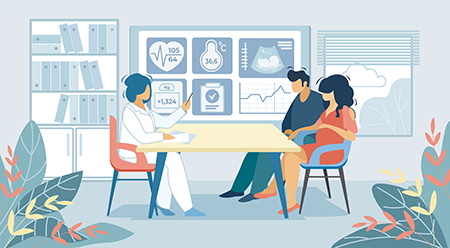 Getting a healthy start: Your prenatal care during the first trimester
Getting a healthy start: Your prenatal care during the first trimester
The first trimester of pregnancy—from 0 to 13 weeks—includes many big milestones in the development of your baby. That’s why early prenatal care is so important. If you’ve recently found out you’re expecting, call your OB GYN’s office to find out your next steps.
With your OB GYN’s help, you can make choices that support a healthy pregnancy from the beginning. Here some of the things you should expect when it comes to your first trimester care.
Your first prenatal appointment
It’s recommended that you have your first prenatal visit during your first trimester. The timing can vary depending on your specific health. But many moms-to-be visit their OB GYN around the 8-week mark. There’s a lot to cover, so you should expect this visit to take longer than a typical checkup.
During your appointment, some of the care you can expect includes:
- Physical exam, including a pelvic exam
- Weight and blood pressure checks
- Review of your health history
- Questions about your health habits and lifestyle
- An ultrasound
- Listening for your baby’s heartbeat
- Estimate of your due date
- Lab work, including a urine sample and blood tests
- Review of any symptoms, such as morning sickness, and tips to help relieve them
- Counseling on genetic testing options
- Discussion of any needed vaccinations
- When to return for your next visit
- Time for you to ask any questions about caring for yourself and your baby
Common first trimester lab tests
At your first trimester appointment, you’ll provide a urine sample and have blood drawn for several different lab tests. These tests can screen for a variety of conditions that could affect your pregnancy. Your OB GYN will check levels of various cells in your blood through a complete blood count (CBC) and check the Rh factor in your blood. Blood tests can also check your immunity to certain conditions like rubella or chickenpox.
The CDC says that you should be tested for HIV, hepatitis B (HBV), hepatitis C (HCV), and syphilis during the first trimester of each pregnancy. Catching any conditions early can help your OB GYN take precautions to reduce the risks of pregnancy complications.
Ultrasounds during the first trimester
Most OB GYNs will perform an ultrasound at your first prenatal appointment. The March of Dimes says that ultrasounds can help check your baby’s size and confirm your due date, as well as check your baby’s heartbeat.
In the early stages of pregnancy, you may have a transvaginal ultrasound to get the best view of your baby. This type of ultrasound uses a wand inserted into the vagina to create the ultrasound images.
First trimester genetic testing
During the first trimester, you’ll be offered additional tests to screen for potential genetic conditions. Your OB GYN can guide you on what tests might be right for you based on factors such as your age or health history.
Some first trimester tests you may choose include:
- Cystic fibrosis carrier testing to determine if you or your partner carry genes related to the condition
- Prenatal cell-free DNA screening, a blood test that can screen for the risk of trisomy 13, trisomy 18, trisomy 21 (Down syndrome), and some other conditions
- First trimester screen, which combines a blood test and ultrasound to provide an estimated risk of trisomy 18 and Down syndrome
- Chorionic villus sampling, which uses a needle to take a sample of the placenta to diagnose several conditions, including trisomy 18, Down syndrome, sickle cell disease, cystic fibrosis, and Tay-Sachs
The Office on Women’s Health says it’s important to remember that some tests, like prenatal cell-free DNA screening and first trimester screen, are only screenings. They are not used to provide a definite diagnosis. If you choose, chorionic villus sampling or other tests performed in the second trimester can be used to diagnose conditions.
When to call your OB GYN
It’s common to have many questions during the first trimester, especially if this is your first pregnancy. Your OB GYN can give you information during your first trimester visit about typical symptoms, what activities you can do, and what to avoid. You should call your OB GYN if you’re experiencing symptoms of a potential pregnancy complication.
According to the U.S. National Library of Medicine, some symptoms that signal a need to call your OB GYN include:
- Severe morning sickness, nausea, or vomiting
- Signs of a urinary tract infection, such as fever or painful urination
- Cramps, bleeding, or unusual discharge
Overall, if you’re unsure about something during these first weeks, a call to your OB GYN can often put your mind at ease. Your care team can help you manage symptoms and know what’s normal and what needs additional care.
